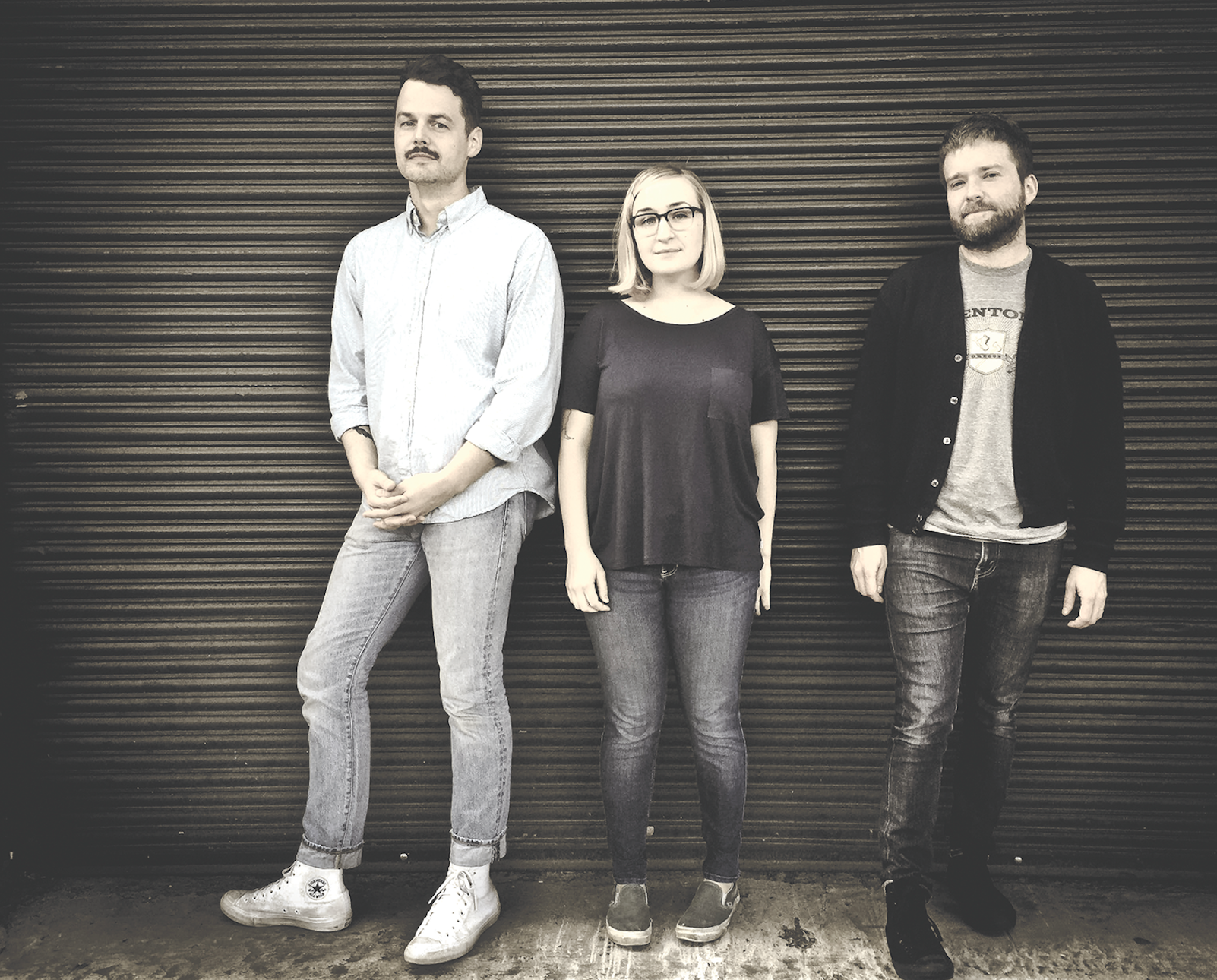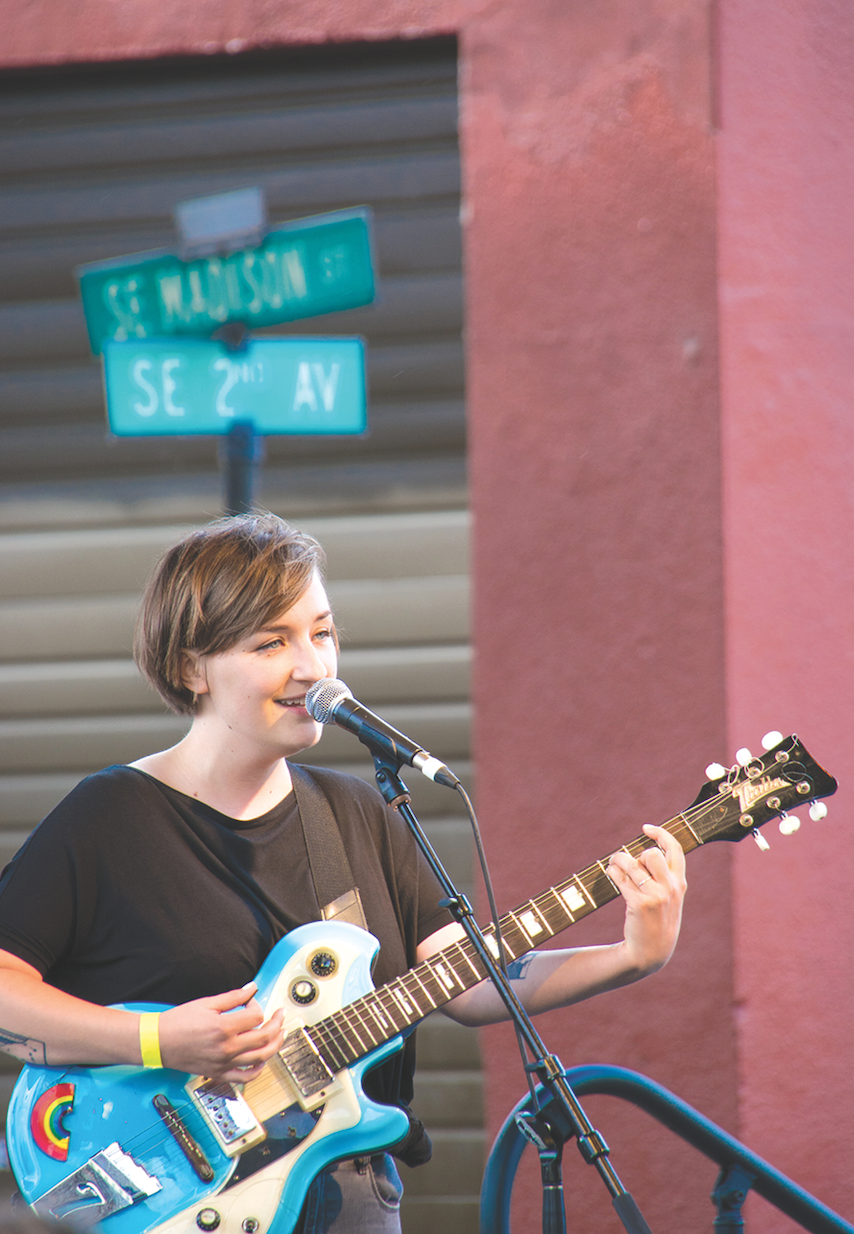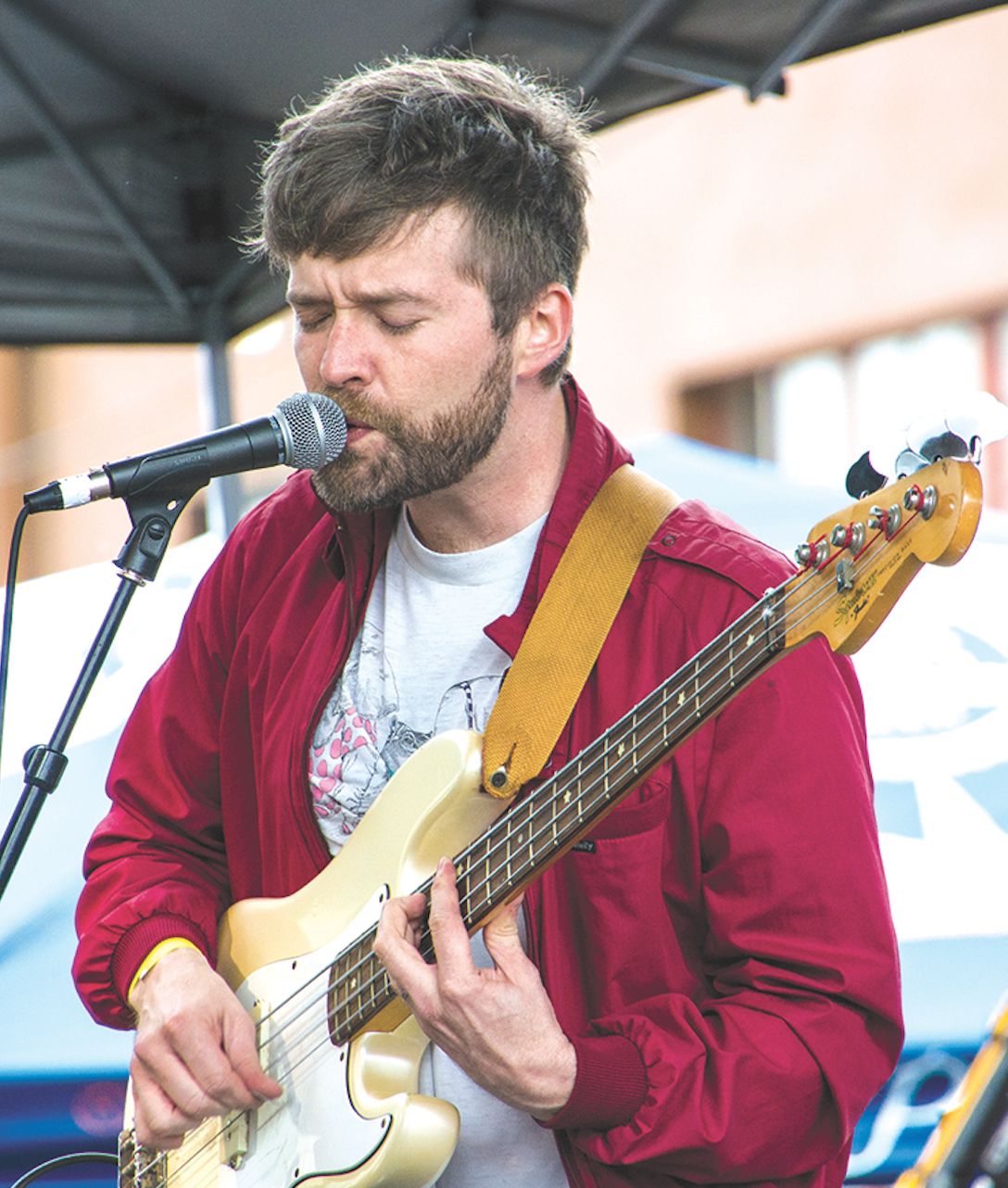bed.


After several years out in the wild, pursuing the hopes of success and recognition that all young musicians harbor, Alex and Sierra Haager, the married duo of bed., have finally settled for being unintentionally hip by doing the sometimes unobvious thing: being themselves. The pair write music that is original and genuine, with brief, vulnerable moments that speak to the uncertain identity of young, white, married (or unmarried) people as the narratives through which our parents nailed themselves to this world wear thin. If growing up is all about becoming who you really are, then although bed.’s newest EP Klickitat is happily inspired by ’90s grunge and shoegaze, it’s clear that these two are over pandering to trends and chasing the perfect mold for success; instead, they’re writing the music that makes them happiest. Their new EP, Klickitat, is out on Bug Hunt.
11: What genre would you guys associate with yourselves?
Sierra Haager: [to Alex] You answer.
Alex Haager: We always tell people it’s slow-fi. But I don’t really know. Alt? Alternative? ’90s alternative punk?
11: Why would you say slow-fi?
AH: Well, “Bother” was the first song we ever wrote and recorded together. And it’s super lo-fi, and it’s super slow.
SH: The thing about slow-fi is it’s a combination of lo-fi and slow, and then we just smashed them together.
11: Is that what’s going on there?
SH: I mean you seem like a smart guy.
11: Well if you guys consider yourself slow-fi, what other bands could identify with that label?
SH: I think Low. They’re not really lo-fi though.
AH: Maybe Granddaddy.
SH: Well, I think in the UK they use lo-fi to just mean indie rock.
AH: Garage.
SH: It’s much less recording-style specific.

11: Is that a characteristic part of slow-fi for you guys, the recording process?
SH: I mean we’ve made some pretty bad recordings.
11: The recordings on the new EP… I wouldn’t call them bad.
SH: No, no, well those are done at practice space studios and home studios, they’re pretty good. I dunno, I don’t think we really spend that much time thinking about it. The last thing any songwriter wants is to be confined by a genre. And also, genres are stupid. But anyone who listens to our band gets a sense pretty quick that we’re not a very fun band.
11: In your first two songs, “Rule” and “Fremm,” the lyrics seem to revolve around two people. There’s a little bit of a dynamic where one person’s talking to the other one, or referring to the other one. You two are married, right?
SH: Yeah.
11: Do you feel like you draw upon your marriage experience for lyrical inspiration?
SH: Not on this record. We just finished a full-length that probably has a lot of growing up. When you get married you grow up really fast. That’s one of the things. You can’t be an asshole anymore. But I think that impression is given because the boy-girl vocal contrast is really different. You can assume that it’s mostly just first-person though. We like the way it sounds.
11: But Alex, so on “Fremm” when you’re singing “I’ve got a friend/who wears my clothes,” are you…
AH: Just talking to myself (laughing)… just looking in the mirror…
11: Do you have her on your mind?
SH: Ok wait. Can I say something?
AH: You can totally just answer this question.
SH: So I remember when you wrote this song. We did this really stupid thing. We moved to Eugene for like six weeks, maybe like two years ago, and hated it so much because it was terrible and our house had giant spiders in it. It was the stupidest thing we’ve ever done. It was totally my idea. And we basically fought the whole time because it was a million degrees, and we had allergies. It was terrible. And I feel like Alex wrote that during that period as a way of being nice to me, and talking about “we still love each other, after all these things.” [laughing.]
AH: We actually forced ourselves to write those songs over the course of two days. And we went in separate rooms, and wrote the songs alone, and came back downstairs and sorted through them together.
11: Your guys’ music, perhaps unintentionally, has its thumb on the pulse of some cultural vibe that seems really current right now. There’s a touch of restless angst, and also this restless daydreaming aspect to it a little bit. Do you feel like you’re doing something that people relate to?
SH: I feel like you just set us up to sound like assholes.
11: Really?
SH: Because we have to talk now about how people like our music, and only assholes talk about how people like your music.
11: Do you think people like your music?
SH: I think some people like it.
11: Why do you think they like it?
SH: Umm, maybe I can tell you why I like it?
11: Sure.
SH: So when you started making music and you’re young, like Ira Glass says, you emulate. You make stuff because you have good taste, but you’re not good at making stuff yet. But you can show off your taste and that indicates that there’s somewhere good maybe for you to go, and if you keep doing it for long enough eventually you’ll get to step out of emulating and step into being creative at some point. So, I think when we both moved here, and we started playing together, we both had sort of gotten to this place where our lives were fulfilling in other ways, and we no longer identified as young people struggling to have a band that people liked. It’s not that we stopped caring because we love making music. But the external element of it stopped being a major factor in what we were making. Like, for example, the band that I had before was an electronic pop project that I did with a guy in Brooklyn, and it was really important to me that the songs be incredibly accessible and simplistic and fun. And Alex was in a very, very hip group, like ukuleles and keyboards. We were both just really trying to do a thing. And I think when we started playing together we stopped needing to do a thing and just started playing music together.
AH: I think we were able to start drawing on the influence of records that we actually liked too, instead of thinking about what would be the coolest thing to do that year.
SH: Right. Yeah. And it sort of backfired. Because people really like the records that we love.
AH: It backfired in a good way.
SH: What we ended up making was a lot hipper than what we were trying to do before.
AH: Right. Like when we stopped thinking about it so much, it came together more naturally.
11: That’s interesting to hear. I mean it could either be an intentional effort or it could just be the natural progression of where you’re at. But it sounds like this is the music you guys would be playing regardless of any outside pressure.
SH: It’s definitely the kind of music we have always been listening to. See, but I think you touched on something interesting culturally, because there are so many bands right now that have this really heavy, like ’90s plus, like ’90s times a fucking billion-
11: -shoegaze and grunge are crushing it right now.

SH: Exactly. And I think it’s because people who grew up listening to those records are coming of age and are learning how to make good records. We both grew up with older siblings. I had an older stepsister who showed me Sonic Youth. Alex is the youngest of three guys. I think we both have 10-year-old music tastes.
AH: I was obsessed with Nirvana from nine until 12.
11: What part of the Portland music scene do you guys find yourself falling into? What bands do you bill with?
SH: We really love Blowout, Little Star, Genders. I guess the Tender Loving Empire scene. They obviously work with a lot of different artists, but I feel like they’ve been really supportive to what we do. We’re releasing this EP on Bug Hunt, which is a subsidiary to Tender Loving Empire. The guy who runs that is our drummer. [Andrew Meininger.]
AH: Who’s also in Typhoon.
11: What did you guys not achieve on this EP that you would like to see on your future records?
AH: There’s something to be said for writing a bunch of songs in a small amount of time and recording them all. Cause like, the EP, the oldest song on it we released two years ago. So it’s not an exact portrayal of who we are right now.
SH: I have a thing about the EP that’s kind of interesting. I think three of the songs deal with sort of the psychology of being a growing up person in a band. Like “The Rule” and “Wayward” and “Boys.” They’re kind of about being really sensitive, and it’s just like, being in a band is really hard. Attention is hard, and disappointment is hard, and there’s a lot of that when you play music.
AH: It’s like a lot of the things you want really badly in being a musician can be the things that bum you out about being a musician too.»
– Ethan Martin




